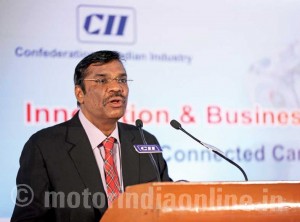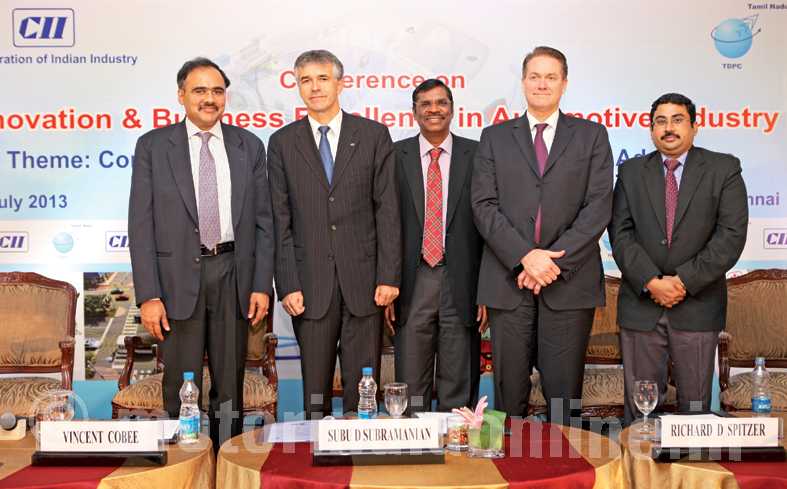
With India’s emergence as one of the fastest growing commercial vehicle markets, the local automotive industry is very well poised to exploit the opportunities related to auto electronics and ICT. As in the case of cars, the CV segment too is undergoing a sea-change with the introduction of more automotive electronic systems such as GPS navigation system, ABS, etc.
This point was emphasized by Mr. Subu D. Subramanian, Conference Chairman & Managing Director & CEO, Defiance Technologies Ltd., while casually discussing the current auto scenario in the country with MOTORINDIA on the sidelines of the CII Conference on Innovation & Business Excellence – Connected Cars – Concept to Consumer – The ICT Advantage held in Chennai.
He also explained the way the group company, Ashok Leyland is laying its additional thrust on introduction of several automotive electronic systems that offer more safety and reliability to its valued customers.
Earlier, delivering his welcome address at the conference, Mr. Subu observed that today the approximate cost of electronics in luxury vehicles is well over 25 per cent of the total manufacturing cost as against just 2.5 per cent in 1970s. This is expected to go up by over 50 per cent within the next five years. Similarly, there are now about 10 million lines of code which drive a luxury automobile as compared to just 100 lines in 1970.
A latest survey reveals that, on an average, over 80 per cent of the innovation and R&D cost is spent on the electronics and embedded systems. Technology companies have never been more involved in systems related to automobile technology. Google’s driverless car initiative is well known, so also are the initiatives taken by other technology leaders like Microsoft. Apple’s recent successful patent of in-vehicle dashboard infotainment design is a testimony to this development.
Mr. Subu referred to the three key technology trends as applicable to the automotive industry. The first is adoption of faster and smarter technologies to reduce product development cycle and cost. Simulation, modelling and virtualization of product engineering, prototyping and manufacturing are expected to improve the quality, and reduce the cost and time-to-market. Dassault Systems, Siemens and several other players in the field are pioneering this approach to automotive, aerospace and other discrete manufacturing industries.
Second, next-generation vehicle technologies are being explored to optimize fuel prices and meet regulatory requirements. Hybrid electric vehicles is one such area of research, amongst others. The third and possibly the most significant is the development of connected technologies coupled with Internet Of Things (IOT), Powerful Processor, GPS & SMAC Technologies.

Moreover, he said, advancements on platform and devices in terms of intuitive User Interfaces, powerful processors, mobile open source platform and display technology are creating a highly favorable eco-system for integrated in In-vehicle Solutions.
Further, the Cadillac User Environment (CUE) system pre-fitted with all-current Cadillac models has emerged as a robust infotainment solution.
According to Mr. Subu, connected vehicles, as a term, has got broader implications for the entire automotive value chain and leading technology companies. What makes this technology most interesting is that it falls at the intersection of four major industry sectors – automotive industry OEMs and suppliers, electronics OEMs, software product development and service companies, and telecom service providers – with each looking at it to drive future sales and business. So it attracts the best brains, talent and entrepreneurship across these industries.
It is interesting to watch as to which industry segment would take the lead to come up with innovative connected vehicle solutions.
He further observed that India has a vibrant globally acknowledged IT industry popular among many of the top auto OEMs and Tier-1 suppliers. Also present are global electronics companies such as Bosch and Philips. As for India, it has an active engineering and IT talent pool and active industry bodies like CII to support their innovative activities.
India is at the cusp of this next wave of automotive revolution driven by an intersection of automobile and technology, and it is advisable to take this opportunity to have a focused Auto Electronics R&D and Innovation Hub in Chennai, he added.
The full-day session was addressed by eminent industry experts.